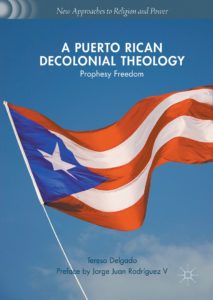Teresa Delgado’s book, A Puerto Rican Decolonial Theology: Prophesy Freedom, is a contribution to liberation and decolonial theology, but above all it is an invitation to further the conversation of Puerto Rican identity in order to elaborate a robust Puerto Rican theology. Readers will quickly appreciate that Delgado projects the voice of un pueblo (a people) in her narrative. This work challenges the audience, especially Puerto Ricans in the Diaspora, to reconcile their identities as both Puerto Rican and American in ways that promulgate liberation. Delgado holds Puerto Rican theologians accountable for dormirse en las pajas (falling asleep in the hay), that is, she charges them with complacency in not addressing issues of colonialism and identity from a Puerto Rican theological perspective. She challenges Latinx theology to undertake a more critical approach to systemic political and economic oppression and prevent its erasure in the homogenizing of cultures. She claims, “Unless Puerto Rican theologians reflect upon their experience of God within the context of Puerto Rican life, the reality of colonization for Puerto Ricans will be slow to emerge as a relevant theme for all US Latinx” (8).
Delgado relies on the work of Latin American liberation theologians, as well as U.S. Latinx theologians, such as Jon Sobrino, Gustavo Gutiérrez, and Virgilio Elizondo in order to build toward a Puerto Rican theology. Thus she adds to the field of Latinx theology, while making a major contribution specifically to the construction of Puerto Rican theology. In addition, Delgado sometimes blurs the lines between the Puerto Rican identity of the Diaspora (those living in any of the 50 States) and those living on the Island. In this way, she projects the complexities and ambiguity of a single Puerto Rican identity. She clearly and proudly defines her own identity as part of the large and historically significant Puerto Rican Diaspora community, especially in Northeast cities like New York. Nonetheless, Delgado endeavors to do justice to the diverse understandings of Puerto Rican identity and holds them together through an analogy of connection with water as the bridge that unites – and at the same time separates – los de aquí y los de allá (those here and those there).
In doing so, Delgado opens the wound of the complex relationship between Puerto Ricans and the United States to ask what it means to make freedom their own. “Puerto Rican theology seeks to bring forth a radical conversion of our very community; a radical conversion of the message of the gospel in order to respond to the call of living into a true and full identity, of participating in the work of salvation, and ushering into the present the vision of an eschatological future of hope” (173). Delgado denounces “the captivity of silence’s” hindering the Puerto Rican people by successfully weaving personal stories and narrative literature using the works of Puerto Rican authors Esmeralda Santiago, Pedro Juan Soto and Rosario Ferré. Through their memoirs and fictional storytelling, they affirm freedom and hope, though also evoking the “not-yet” aspects of Puerto Rican reality.
Delgado’s own writing manifests her sentiment, passion, pain, and commitment for Puerto Rico as she offers fluid, open-ended interpretation of her literary interlocutors. “Their stories suggest something beyond the history where dreams of the imagination create a prophetic vision of freedom from colonization for our people” (47). Through the narratives of these literary authors and by bridging their work with the theology of Christopher Morse, among others, Delgado assertively articulates a Puerto Rican decolonial theology of anthropology, soteriology, and eschatology. Delgado does good work in developing a Puerto Rican theology through these three areas of traditional Systematic Theology.
However, it is important to note that Delgado’s study does not include religious expressions outside of Christianity that have had an impact on Puerto Rican reality, such as Espiritismo, Santería, etc. Of course, this would require engagement with other forms of creative expression as well, beyond literature, such as music and dance (e.g., the Afro-Puerto Rican music and dance form – bomba). Such engagement can give us a fuller mapping of the Puerto Rican religious experience that further informs and complicates a decolonial prophesy. Thus, in continuity with her aim to unveil a more complete Puerto Rican liberation theology, I would suggest an interfaith analysis as a next stage of development in Puerto Rican theology.
Teresa Delgado’s work is important, not only for Puerto Ricans, but for all who are interested in understanding the deep theological connections between identity, freedom, and the need to affirm and reconcile the tensions of the colonizer and the colonized that are embodied in the Latinx person. In her use of recent Puerto Rican literature, Delgado depicts a road toward decolonization through acceptance, agency, and self-validation. Delgado believes and demonstrates in this book that the story of her people “has a profound effect on our ability to do justice in the world” (21) as it fosters and cultivates a prophetic voice. A Puerto Rican Decolonial Theology: Prophesy Freedom opens up a space for the Puerto Rican people to move forward, and demand and enact justice, accountability, and reparations for the colonized and the oppressed.
Boston University




